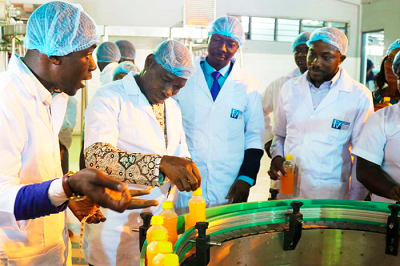
Fixing tax stamps on bottles slows down production - beverage companies complain
Naa Lamiley Bentil
Business News
Some beverage producing companies operating in and around Nsawam in the Eastern Region have raised concerns about the application of the tax stamp recently introduced by the Ghana Revenue Authority (GRA) to improve revenue generation in the beverage industry.
The companies believe the system that is used to fix the stamp on bottles slows down the production process, which affects their output.
The issue came up during an industrial tour by the Eastern Regional Minister, Mr Eric Kwakye Darfour, and the Eastern and Volta branch of the Association of Ghana Industries (AGI) to some companies in the Nsawam Adoagyiri Municipality of the Eastern Region.
The tour took the team, made up of Mr Darfour and his Deputy, Mr Samuel Nuertey Ayertey, and executives of the AGI Eastern and Volta branches, to inspect the special treatment project, which, when completed, will employ 1,500 people.
The team also visited the 13th January company, producers of Ann Mineral Water, with a production capacity of 31,000 bottles of water in a day, and Blackman, which is into fish farming and hatchery.
Other places visited included C.K Engineering, who are into quarry and the production of concrete poles for electrification, Blue Skies, producers of fresh cut fruit and Bomarts Farms Limited.
The rest are Fedek Ventures Limited, producers of Ultimate Natural Mineral Water and Bounzy drink, as well as Africa Cola, producers of Africa Cola drinks.
Concerns.
At the 13th January Company, an official, Mr Godwin Mawuko Yaelui, explained that both the manpower and automated system of afixing the tax stamp delayed production aside from the additional cost it had also brought on to the production.
According to him, using manpower meant engaging more hands. Meanwhile, the automated system also relied on electricity and was installed such that the packaging was halted anytime there was a problem with the machine.
Work with GRA
Mr Darfour expressed concern about the problems faced by the companies.
“If your capacity is about 40,000 per hour, it slows you down to about 20,000 and you have workers you are paying, then it's a situation that must be addressed’’.
He said some of the companies had secured loans from financial institutions but as a result of the delays they could not meet their production targets to settle their debts.
He urged the companies to officially address such problems to his office so that the necessary action could be taken.
1D1F
He said so far 10 companies in the Eastern Region had been officially admitted onto the “One district One factory” programme and have secured finance from GCB, Exim Bank and ADB and were at various stages of putting up their infrastructure and would soon go into production.
AGI
The Chairman of the Eastern and Volta branch of the AGI, Mr Dela Gadzanku, said the tour was jointly organised by the AGI and the Eastern Regional Coordinating Council to enable the officials to learn at first hand the contribution and challenges industries in the region were facing for appropriate solutions to be found.
He stated that the association was providing opportunities for some of the industries to market their products to other parts of the country and beyond through trade fairs and exhibitions.